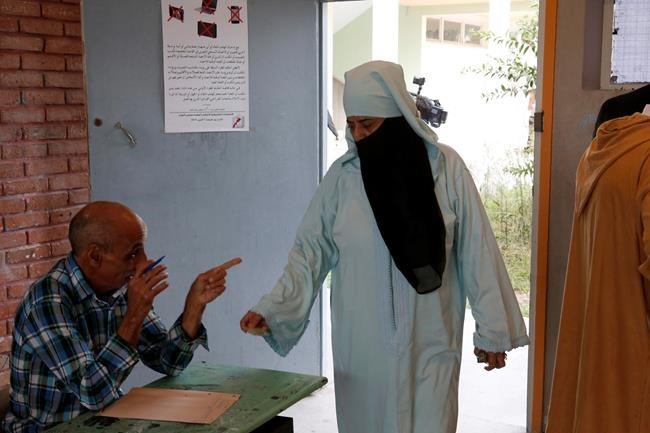
A woman casts her ballot at a polling station for the parliamentary elections, in Rabat, Morocco, Friday, Oct. 7, 2016. Millions of Moroccans hit the voting booths, with worries about joblessness and extremism on many minds as they choose which party will lead their next government.(AP Photo/Abdeljalil Bounhar)
Republished October 07, 2016 - 6:32 PM
Original Publication Date October 07, 2016 - 12:00 AM
RABAT, Morocco - Preliminary results in Morocco's national elections showed the moderate Islamist Party of Justice and Development in the lead, despite frustration with its handling of the economy in its five years leading the government and a challenge from a party close to the royal palace.
With most of the votes counted, the Interior Ministry said early Saturday that the PJD had won 99 seats in the Chamber of Representatives in Friday's legislative elections. Its closest rival, the Party of Authenticity of Modernity, won 80 seats, followed by several other parties.
Of 395 seats in the chamber, 303 had been decided by early Saturday. The vote was still being tallied for two seats, and the 90 other seats are reserved for women and youth who will be chosen proportionally from the lists of the winning parties. Final results are expected later Saturday.
The results suggest no single party will have a majority, meaning the winner will likely have to form a coalition government.
An unusually venomous campaign marked by adultery scandals and an alleged extremist attack planned for election day preceded the balloting in this North African nation, which is seen as a model of stability and relative prosperity in the region.
Worries about youth joblessness, high debt and Islamic extremism were on many voters' minds as they cast their ballots. Turnout was slightly lower than in the past national elections in 2011, at 43 per cent.
Reports and videos surfaced online about alleged voting violations, including ballot stuffing, votes casts under the names of dead people, and authorities blocking a road to a voting site. The Interior Ministry issued statements denying most of the claimed irregularities, but said it was investigating others. Some 4,000 Moroccan and international observers were monitoring the elections.
"It's in God's hands now," Prime Minister Abdelilah Benkirane told The Associated Press after casting his ballot.
Benkirane's PJD has dominated parliament since the last legislative elections in 2011, and led a government coalition comprised of several parties with differing ideologies.
The party faced tough competition from the Party of Authenticity and Modernity (PAM), widely regarded as close to the palace. It was founded in 2008 by Fouad Ali El Himma, childhood friend of King Mohammed VI and a current royal adviser.
The palace pledged to loosen control over Moroccan politics after Arab Spring protests five years ago, but still retains control over major policy decisions — prompting many Moroccans to ignore the elections Friday.
The king attended a Friday prayer sermon, during which the imam emphasized the importance of voting.
To help illiterate voters, each party was represented by a symbol on the ballot as well as its name — a lamp for the PJD, a tractor for the PAM, and other symbols for the other 26 parties.
This week, Benkirane slammed Ilyas El-Omari, head of the PAM, for comments he made to AP suggesting that state-funded associations were among groups involved in radicalizing Moroccan youth.
With high unemployment and relatively low literacy, Morocco has been fertile recruiting ground for extremists. As many as 1,000 Moroccans have joined the ranks of the Islamic State group in Iraq and Syria.
On Monday, authorities said they had dismantled a 10-member terror cell comprised entirely of women with alleged ties to IS.
The cell planned to carry out attacks on election day, according to Abdelhak Khiame, head of Morocco's Central Bureau of Judicial Investigations. Seven of its 10 members were minors, he said.
Nearly 7,000 candidates ran in 92 voting districts for seats in the Chamber of Representatives, which has the final say in Moroccan legislation.
Abdul-Wahab Kayyali, a doctoral candidate in political science at George Washington University, said "these elections, specifically, matter a lot ... and will show whether 2011 was just a blip on the radar screen" in gauging Morocco's path toward reform.
The 2011 Arab Spring uprisings have left a mixed legacy in North Africa — Tunisia built a fragile democracy, Egypt elected Islamists who were then ousted by the military and Libya has descended into deadly chaos.
___
Associated Press journalist Andrew Drake contributed to this report.
News from © The Associated Press, 2016